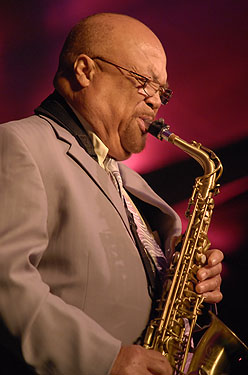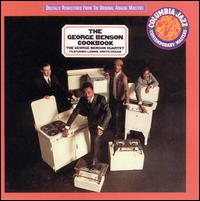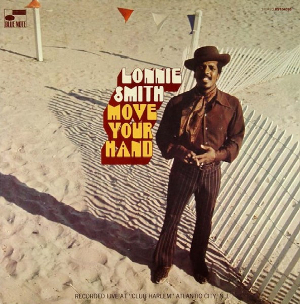
George Washington Benson is an American jazz fusion guitarist, singer, and songwriter. He began his professional career at the age of 19 as a jazz guitarist.
Jazz rap is a fusion of jazz and hip hop music, as well as an alternative hip hop subgenre, that developed in the late 1980s and early 1990s. AllMusic writes that the genre "was an attempt to fuse African-American music of the past with a newly dominant form of the present, paying tribute to and reinvigorating the former while expanding the horizons of the latter." The rhythm was rooted in hip hop over which were placed repetitive phrases of jazz instrumentation: trumpet, double bass, etc. Groups involved in the formation of jazz rap included A Tribe Called Quest, Digable Planets, De La Soul, Gang Starr, The Roots, Jungle Brothers, and Dream Warriors.

Eugene McDuffy, known professionally as "Brother" Jack McDuff or "Captain" Jack McDuff, was an American jazz organist and organ trio bandleader who was most prominent during the hard bop and soul jazz era of the 1960s, often performing with an organ trio. He is also credited with giving guitarist George Benson his first break.

I Got Dem Ol' Kozmic Blues Again Mama! is the debut solo and third studio album overall by American singer-songwriter Janis Joplin, released on September 11, 1969. It was the first album which Joplin recorded after leaving her former band, Big Brother and the Holding Company, and the only solo album released during her lifetime.

Ronald Edward Cuber was an American jazz saxophonist. He also played in Latin, pop, rock, and blues sessions. In addition to his primary instrument, baritone sax, he played tenor sax, soprano sax, clarinet, and flute, the latter on an album by Eddie Palmieri as well as on his own recordings. As a leader, Cuber was known for hard bop and Latin jazz. As a side man, he had played with B. B. King, Paul Simon, and Eric Clapton. Cuber can be heard on Freeze Frame by the J. Geils Band, and one of his most spirited performances is on Dr. Lonnie Smith's 1970 Blue Note album Drives. He was also a member of the Saturday Night Live Band.

James Wesley "Red" Holloway was an American jazz saxophonist.

Lonnie Smith, styled Dr. Lonnie Smith, was an American jazz Hammond B3 organist who was a member of the George Benson quartet in the 1960s. He recorded albums with saxophonist Lou Donaldson for Blue Note before being signed as a solo act. He owned the label Pilgrimage, and was named the year's best organist by the Jazz Journalists Association nine times.

The George Benson Cookbook is the third studio album by jazz/soul guitarist George Benson, and the second to be produced by John Hammond.

Peter Andrew Bernstein is an American jazz guitarist.

The Even Dozen Jug Band is the debut and only studio album by the American jug band Even Dozen Jug Band, released in 1964.

Alligator Bogaloo is an album by jazz saxophonist Lou Donaldson recorded for the Blue Note label in 1967 and featuring Donaldson with Melvin Lastie, Lonnie Smith, George Benson, and Leo Morris.

Midnight Creeper is an album by jazz saxophonist Lou Donaldson recorded for the Blue Note label in 1968 and featuring Donaldson with Blue Mitchell, Lonnie Smith, George Benson, and Leo Morris.

Sugar is an album by jazz saxophonist Stanley Turrentine, his first recorded for the CTI Records label following his long association with Blue Note, featuring performances by Turrentine with Freddie Hubbard, George Benson, Ron Carter, and Billy Kaye with Lonnie Liston Smith added on the title track and Butch Cornell and Richard "Pablo" Landrum on the other two tracks on the original release. The CD rerelease added a live version of the title track recorded at the Hollywood Palladium in 1971.

Move Your Hand is a live album by American organist Lonnie Smith recorded at Club Harlem in Atlantic City, New Jersey in 1969 and released on the Blue Note label.

It's Uptown is the second studio album by jazz/soul guitarist George Benson.
"I Walk on Guilded Splinters" is a song written by Mac Rebennack using his pseudonym of Dr. John Creaux. It first appeared as the closing track of his debut album Gris-Gris (1968), credited to Dr. John the Night Tripper. The song has subsequently been performed and recorded by many other musicians, including Widespread Panic, The Neville Brothers, Cher, Marsha Hunt, Johnny Jenkins, Humble Pie, King Swamp, the Allman Brothers Band, Paul Weller, the Flowerpot Men, Michael Brecker, Tedeschi Trucks Band and Jello Biafra.

Afro–desia is an album by American jazz organist Lonnie Smith recorded in 1975 and released on the Groove Merchant label.

Keep On Lovin' is an album by American jazz organist Lonnie Smith recorded in 1976 and released on the Groove Merchant label.

Mama Wailer is an album by American jazz organist Lonnie Smith recorded in 1971 and released on the Kudu label.

McGriff's House Party is an album by organist Jimmy McGriff recorded in 1999 and released on the Milestone label the following year.


















